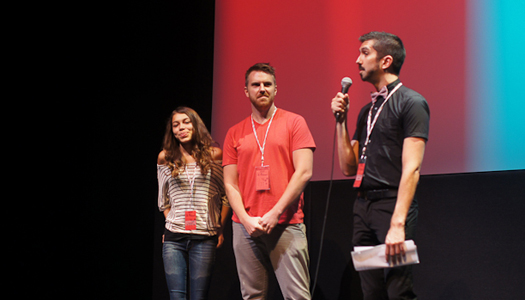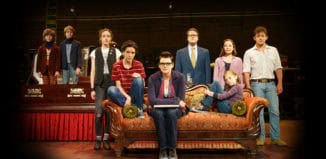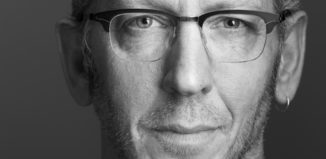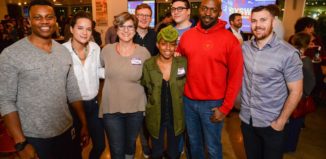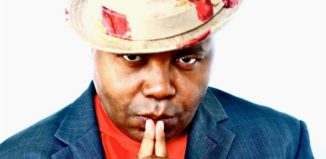Since 1987, the Austin Gay and Lesbian International Film Festival (AGLIFF) has brought LGBTQI films to Central Texas. Perhaps because of a quarter-life crisis—the festival celebrated its 25th birthday this year—AGLIFF underwent a re-brand and changed its name to Polari. With a new look, a new name, and new films, AGLIFF/Polari gave Austin five days of meaningful film, discussion, and community.
So, what is Polari? The word refers to a secret slang/language used by the gay community in the UK during the twentieth century. Prior to being appropriated by the gay community, the polari language was used by other ostracized individuals. The festival’s name change is an effort to strengthen and continue the ongoing dialogue about LGBTQIA issues through community building and film. The change goes hand in hand with the festival’s theme this year: A Place for Us.
 Before the festival’s opening night screening of Cloudburst, Film Programming Director Curran Nault explained that the focus of the 2012 AGLIFF-Polari festival was to “push the inclusivity of the people and genres represented” while highlighting local filmmakers.
Before the festival’s opening night screening of Cloudburst, Film Programming Director Curran Nault explained that the focus of the 2012 AGLIFF-Polari festival was to “push the inclusivity of the people and genres represented” while highlighting local filmmakers.
Alex Barron, a professor at St. Edward’s University who teaches a course on gay and lesbian film, has been involved with AGLIFF both as a judge and audience member since moving to Austin in 1993.
“It’s changed in a lot of different directions,” Barron said. “Some years it has more commercial fare, some years seem to have lighter movies and more comedies, and other years are dominated by documentaries. There are definitely more types of queer experiences being represented on screen now—more trans films, more films by people of color—and the festival reflects that.”
Like many audience members, Barron values the diverse films and stories being shared at the festival.
“Although there is a ton more mainstream representation of GLBT communities then when the festival started 25 years ago, we still don’t all have access to rich, varied representations of queer people,” he said. “We need a place to see films about all of the people who make up the GLBT communities.”
AGLIFF-Polari featured heart-wrenching documentaries, somber international narratives, and touching short films. Despite the variation in types of film, subject matter, and quality of film, there were common themes throughout the festival. Starting with the opening night and continuing through the last day, audiences saw multiple films about LGBT generational issues. Another common thread throughout the festival was activism. With documentaries like Call Me Kuchu and United In Anger: A History of ACT UP, the activism of the HIV/AIDS and LGBTQIA movements was on display. Some of the strongest international films dealt with issues facing Muslim LGBTQIA characters. Feature films like Facing Mirrors, My Brother The Devil, and The Invisible Men confronted issues of homophobia and survival in settings where being LGBTQIA meant risking life and limb.
The Portuguese phrase a luta continua, “the struggle continues,” punctuates nearly every major moment in the documentary Call Me Kuchu. The film follows David Kato, a Ugandan LGBT rights activist, as he works to end LGBT discrimination. Kato and his supporters use the Portuguese phrase as a coda to their conversations about discrimination, their lack of security, and the appalling ramifications of the Uganda Anti-Homosexuality Bill. This piece of legislature made homosexuality punishable by life imprisonment or death.

The Austin Film Society (AFS) sponsored the screening for Call Me Kuchu. Stephen Jannise, film program director for AFS, introduced the film.
“The knee-jerk reaction to a movie like this is ‘Why don’t they leave and go somewhere else where they can be happier and it’s easier’” said Jannise. “I think what’s amazing about this movie is these incredible people just want to be happy where their home is.”
Jannise’ sentiment is exactly what AGLIFF-Polari’s theme of “A Place For Us” attempts to get at. Despite the fact that Kato and his followers risk their lives by staying in Uganda, they just want to make their home a place for them. Call Me Kuchu is an extreme and scary example of the issues facing the LGBTQIA community, but the passion with which Kato and his supporters fought for LGBT rights was equally matched in many of the films screened at AGLIFF-Polari.
Another memorable documentary, United In Anger: A History of ACT UP, chronicled the militant activism of ACT UP (AIDS Coalition to Unleash Power) in the 1980s. The documentary served as a timeline of ACT UP from its creation in 1987 to its most memorable demonstrations in the ‘90s. The screening of United In Anger was accompanied by a documentary short, Why We Ride: The Story of AIDS/LifeCycle, about the charity ride from San Francisco to Los Angeles to raise money for the fight against HIV/AIDS. Both films showcased the urgency inherent in the fight against HIV/AIDS.
For audience member Lesli Simms, United In Anger was inspiring not only for the LGBTIQIA community, but also for all minority communities.
“Any person who identifies as an ‘other’ or some kind of minority will be affected by this movie,” Simms said. “The movie and festival majorly conveyed the urgency, sadness, resilience and far-reaching effects of the HIV/AIDS movement. The film showed how this movement intersected with the fight for universal health care, feminism, sexual freedom, race, class, poverty, and the government. The movie showed that anyone can exact change if they are passionate enough.”
AGLIFF-Polari is about inclusivity, building a sense of place and community, and sharing diverse stories of LGBTQIA struggle and triumph. For first-time audience member Ryan Mitchell, AGLIFF-Polari is an opportunity to experience a sense of community and share in the talents of LGBTQIA filmmakers.


















